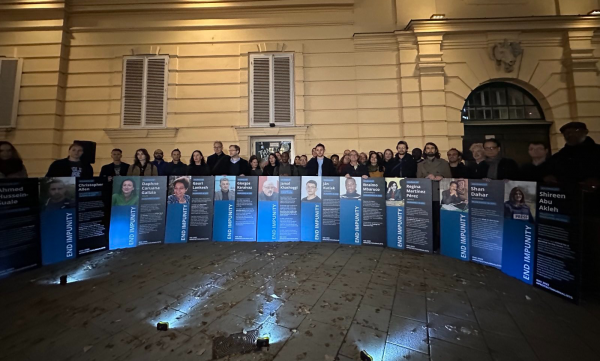The International Press Institute (IPI) today welcomed news that a group of journalists kidnapped in Syria has been freed, but renewed its call for the release of three others currently believed held there.
NBC News Chief Foreign Correspondent Richard Engel and four others were freed Monday following a firefight that erupted when captors transporting them encountered a rebel checkpoint.
The group – which news reports have indicated included NBC News Turkish correspondent Aziz Akyavas, producer Ghazi Balkiz, cameraman John Kooistra and an unnamed engineer – was kidnapped five days earlier by what Engel said he believed to be members of a Shia militia loyal to Syrian President Bashar al-Assad. Engel yesterday said that the group was subjected to psychological torture, including mock executions, and that one of its guides was summarily executed following the group’s capture.
Three other foreign journalists are currently believed to be held in Syria: Ukrainian journalist Anhar Kochneva, Jordanian-Palestinian correspondent Bashar Fahmi and freelance U.S. reporter Austin Tice.
According to the Kyiv Post, rebels who captured Kochneva in October near the city of Homs have threatened to execute her this Sunday unless their demands are met. The rebels previously reportedly threatened to kill her on Dec. 13 if they did not receive a $50 million (USD) ransom. However, a reported spokesperson for Kochneva’s captors recently said that money was not one of their as-yet-publicly-unreleased demands.
IPI Deputy Director Anthony Mills said: “While we are pleased that Mr. Engel, Mr. Akyavas and their crew have been freed and are unharmed, we urge all parties to the conflict in Syria to recognize that journalists are not legitimate targets and we urge the immediate release of Ms. Kochneva, Mr. Fahmi and Mr. Tice. We similarly call on the leaders of Russia – which has close ties with the Syrian government – and of the United States, the United Kingdom, France and the European Union, which have granted recognition to opposition forces, to press for the release of all journalists held in Syria.”
Kochneva was in Syria reporting on behalf of a number of Russian media outlets and assisting other Russian journalists, and she had been strongly critical of opposition forces. Her captors have accused her of working on behalf of the Russian military, a claim she confirmed in the second of two videos posted online by her captors in November. However, many observers have expressed concern that the statement was made under duress.
Bashar Fahmi, a Jordanian citizen of Palestinian origin, was working for U.S.-funded Arabic-language satellite station Al Hurra when he disappeared with his cameraman, Turkish journalist Cuneyt Ünal, on Aug. 20 in Aleppo. The pair was travelling with anti-regime forces when they were caught in fighting that killed Japanese reporter Mika Yamamoto.
Ünal was released Nov. 17, but Fahmi’s whereabouts remain unknown. Reporters Without Borders (RSF) reported on Nov. 6 that “reliable sources” said Fahmi was “alive and in good health” despite having been wounded in the shoulder and hospitalised in Damascus. The group noted that its information contradicted a previous government statement denying that the regime was holding Fahmi.
Tice, a former U.S. Marine, disappeared in Syria in mid-August. The Czech Republic’s ambassador to Syria said later that month that government forces detained Tice on the outskirts of Damascus. A video posted online in November purported to show the journalist being held by armed Islamic fundamentalists, but experts said they thought the video may have been staged. His whereabouts and the true identity of his captors remain unknown.


